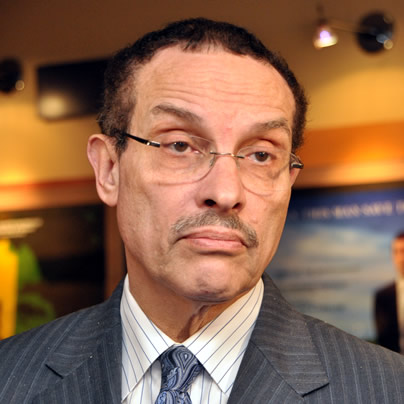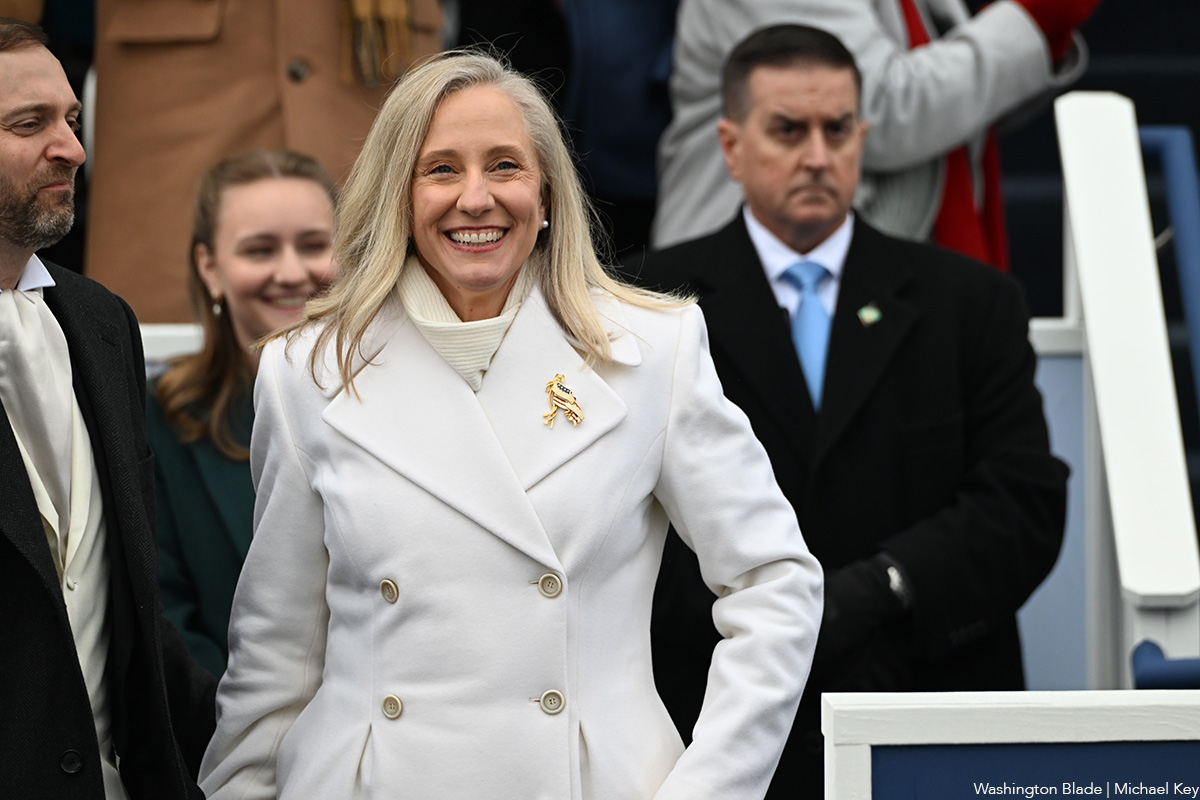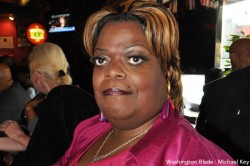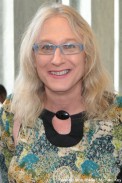Local
Gray nominates two transgender women to Human Rights Commission
If confirmed, they would become first transgender persons serving on commission

Mayor Vincent Gray has nominated transgender activists Earline Budd and Alexandra Beninda for seats on the D.C. Commission on Human Rights.
If the two are confirmed by the City Council, as expected, they would become the first transgender persons to serve on the 15-member commission, which rules on discrimination complaints brought under the comprehensive D.C. Human Rights Act.
The act bans discrimination in employment, housing, public accommodations and other areas based on an individual’s sexual orientation and gender identity and expression as well as other categories such as race, religion, national origin, and ethnicity.
“To be getting one transgender person on the commission would be great, but to be getting two is fantastic,” said Beninda, a systems analyst for a software company and member and former treasurer of the Gertrude Stein Democratic Club, the city’s largest LGBT political group.
“I’m really excited and looking forward to serving,” said Budd while attending Saturday’s LGBT Youth Pride festival in Dupont Circle. “This is important for the entire community.”
Budd released to the Blade an email she received last week informing her of the appointment.
“I am pleased to inform you that Mayor Vincent C. Gray has transmitted your nomination to the Council of the District of Columbia, where it is pending Council consideration,” said Davida L. Crockett, an official with the city’s Office of Boards and Commissions, in the April 26 email to Budd.
“The Office of Boards and Commissions appreciated your willingness to serve the District, and is confident that you will bring a strong and dedicated commitment and leadership to this public service,” Crockett told Budd in the email.
Beninda said she received a similar email informing her of her nomination to serve on the commission.
Pedro Ribeiro, director of the Mayor’ Office of Communications, released to the Blade on Monday a letter from Gray to City Council Chair Kwame Brown (D-At-Large) dated April 26 that places Budd’s and Beninda’s names in nomination for the Human Rights Commission appointments. Gray’s letter also places in nomination eleven other people he has designated as appointees to the commission.
Budd currently serves as a treatment and healing specialist for Transgender Health Empowerment (THE), a D.C. based transgender advocacy and services organization that she helped found in 1996.
Budd has been credited with playing a key role in transgender advocacy efforts and HIV prevention efforts targeting the transgender and LGBT youth communities in D.C. for over 20 years. Among her duties at THE is to provide training for D.C. government and private sector employees, including employees at the city’s Department of Corrections, on transgender related issues.
In addition to her association with the Stein Club, Beninda is a member of the board of the D.C. LGBT Community Center and serves as treasurer of the D.C. based All Souls Unitarian Church. She says she’s also an active volunteer with D.C. Democracy, a group that advocates for D.C. voting representation in Congress and greater home rule autonomy for the city.
The Commission on Human Rights is an independent agency within the D.C. Office of Human Rights. The OHR investigates discrimination complaints and sends them to the commission for a ruling if the office finds probable cause that discrimination might have taken place. Commissioners are appointed to three-year terms and don’t receive compensation.
Budd’s and Beninda’s appointments come at a time when the Commission on Human Rights has been operating with just three members, with 12 of its 15 seats vacant since January, according to Garrett King, director of the City Council’s Committee on Aging and Community Affairs, which has jurisdiction over the commission.
King said Councilmember Marion Barry (D-Ward 8), who chairs the committee, was looking forward to receiving the names of nominees to fill the vacant positions and
plans to take steps to move the approval process forward as soon as Council Chair Brown forwards the list of nominees to the committee.
Ribeiro said the list of nominees that Gray just sent to the Council, including nominees of Budd and Beninda, would fill all of the vacant positions on the commission.
Among the three remaining members of the commission pending the new appointments are openly gay appointees Christopher Dyer, who served as director of the city’s Office of GLBT Affairs under former Mayor Adrian Fenty; and Michael Ward, an attorney in private practice.
Dyer has completed two terms and isn’t eligible for re-appointment. A request for Ward’s appointment to a second term is included in the list of nominees that Gray sent to the Council on April 26.
In addition to Barry, the other Council members serving on the committee that will oversee the new commission nominees are Jim Graham (D-Ward 1), Tommy Wells (D-Ward 6), Yvette Alexander (D-Ward 7), and Vincent Orange (D-At-Large).
King said Barry plans to take steps to move the approval process forward as soon as Council Chair Brown forwards the list of nominees to the committee.
“I congratulate the mayor for his choices,” Graham said in referring to Gray’s nomination of Budd and Beninda.
“Miss Budd is a true pioneer on these issues and having her on the commission makes splendid sense,” Graham said.
The late D.C. gay rights leader Frank Kameny was appointed to the Human Rights Commission in 1975 by former Mayor Walter Washington, becoming the first known openly gay appointee to a D.C. government position. Several gay men and lesbians, in addition to Dyer and Ward, have served on the commission in the ensuing years.
Virginia
Va. activists preparing campaign in support of repealing marriage amendment
Referendum about ‘dignity and equal protection under the law’

Virginia voters in November will vote on whether to repeal their state’s constitutional amendment that defines marriage as between a man and a woman.
Democratic Gov. Abigail Spanberger on Feb. 6 signed House Bill 612 into law. It facilitates a referendum for voters to approve the repeal of the 2006 Marshall-Newman Amendment. Although the U.S. Supreme Court’s Obergefell ruling extended marriage rights to same-sex couples across the country in 2014, codifying marriage equality in Virginia’s constitution would protect it in the state in case the decision is overturned.
Maryland voters in 2012 approved Question 6, which upheld the state’s marriage equality law, by a 52-48 percent margin. Same-sex marriage became legal in Maryland on Jan. 1, 2013.
LGBTQ advocacy groups and organizations that oppose marriage equality mounted political campaigns ahead of the referendum.

Equality Virginia has been involved in advancing LGBTQ rights in Virginia since 1989.
Equality Virginia is working under its 501c3 designation in conjunction with Equality Virginia Advocates, which operates under a 501c4 designation, to plan campaigns in support of repealing the Marshall-Newman Amendment.
The two main campaigns on which Equality Virginia will be focused are education and voter mobilization. Reed Williams, the group’s director of digital engagement and narrative, spoke with the Washington Blade about Equality Virginia’s plans ahead of the referendum.
Williams said an organization for a “statewide public education campaign” is currently underway. Williams told the Blade its goal will be “to ensure voters understand what this amendment does and why updating Virginia’s constitution matters for families across the commonwealth.”
The organization is also working on a “robust media and voter mobilization campaign to identify and turn out voters” to repeal Marshall-Newman Amendment. Equality Virginia plans to work with the community members to guarantee voters are getting clear and accurate information regarding the meaning of this vote and its effect on the Virginia LGBTQ community.
“We believe Virginia voters are ready to bring our constitution in line with both the law and the values of fairness and freedom that define our commonwealth,” said Equality Virginia Executive Director Narissa Rahaman. “This referendum is about ensuring loving, committed couples and their families are treated with dignity and equal protection under the law.”
The Human Rights Campaign has also worked closely with Equality Virginia.
“It’s time to get rid of outdated, unconstitutional language and ensure that same sex couples are protected in Virginia,” HRC President Kelley Robinson told the Blade in a statement.
District of Columbia
D.C. police arrest man for burglary at gay bar Spark Social House
Suspect ID’d from images captured by Spark Social House security cameras

D.C. police on Feb. 18 arrested a 63-year-old man “of no fixed address” for allegedly stealing cash from the registers at the gay bar Spark Social House after unlawfully entering the bar at 2009 14th St., N.W., around 12:04 a.m. after it had closed for business, according to a police incident report.
“Later that day officers canvassing for the suspect located him nearby,” a separate police statement says. “63-year-old Tony Jones of no fixed address was arrested and charged with Burglary II,” the statement says.
The police incident report states that the bar’s owner, Nick Tsusaki, told police investigators that the bar’s security cameras captured the image of a man who has frequently visited the bar and was believed to be homeless.
“Once inside, the defendant was observed via the establishment’s security cameras opening the cash register, removing U.S. currency, and placing the currency into the left front pocket of his jacket,” the report says.
Tsusaki told the Washington Blade that he and Spark’s employees have allowed Jones to enter the bar many times since it opened last year to use the bathroom in a gesture of compassion knowing he was homeless. Tsusaki said he is not aware of Jones ever having purchased anything during his visits.
According to Tsusaki, Spark closed for business at around 10:30 p.m. on the night of the incident at which time an employee did not properly lock the front entrance door. He said no employees or customers were present when the security cameras show Jones entering Spark through the front door around 12:04 a.m.
Tsusaki said the security camera images show Jones had been inside Spark for about three hours on the night of the burglary and show him taking cash out of two cash registers. He took a total of $300, Tsusaki said.
When Tsusaki and Spark employees arrived at the bar later in the day and discovered the cash was missing from the registers they immediately called police, Tsusaki told the Blade. Knowing that Jones often hung out along the 2000 block of 14th Street where Spark is located, Tsusaki said he went outside to look for him and saw him across the street and pointed Jones out to police, who then placed him under arrest.
A police arrest affidavit filed in court states that at the time they arrested him police found the stolen cash inside the pocket of the jacket Jones was wearing. It says after taking him into police custody officers found a powdered substance in a Ziploc bag also in Jones’s possession that tested positive for cocaine, resulting in him being charged with cocaine possession in addition to the burglary charge.
D.C. Superior Court records show a judge ordered Jones held in preventive detention at a Feb. 19 presentment hearing. The judge then scheduled a preliminary hearing for the case on Feb. 20, the outcome of which couldn’t immediately be obtained.
District of Columbia
Judge rescinds order against activist in Capital Pride lawsuit
Darren Pasha accused of stalking organization staff, board members, volunteers

A D.C. Superior Court judge on Feb.18 agreed to rescind his earlier ruling declaring local gay activist Darren Pasha in default for failing to attend a virtual court hearing regarding an anti-stalking lawsuit brought against him by the Capital Pride Alliance, the group that organizes D.C.’s annual Pride events.
The Capital Pride lawsuit, initially filed on Oct. 27, 2025, accuses Pasha of engaging in a year-long “course of conduct” of “harassment, intimidation, threats, manipulation, and coercive behavior” targeting Capital Pride staff, board members, and volunteers.
In his own court filings without retaining an attorney, Pasha has strongly denied the stalking related allegations against him, saying “no credible or admissible evidence has been provided” to show he engaged in any wrongdoing.
Judge Robert D. Okum nevertheless on Feb. 6 approved a temporary stay-away order requiring Pasha to stay at least 100 feet away from Capital Pride’s staff, volunteers, and board members until the time of a follow-up court hearing scheduled for April 17. He reduced the stay-away distance from 200 yards as requested by Capital Pride.
In his two-page order issued on Feb. 18, Okun stated that Pasha explained that he was involved in a scooter accident in which he was injured and his phone was damaged, preventing him from joining the Feb. 6 court hearing.
“Therefore, the court finds there is a good cause for vacating the default,” Okun states in his order.
At the time he initially approved the default order at the Feb. 6 hearing that Pasha didn’t attend, Okun scheduled an April 17 ex parte proof hearing in which Capital Pride could have requested a ruling in its favor seeking a permanent anti-stalking order against Pasha.
In his Feb. 18 ruling rescinding the default order Okun changed the April 17 ex parte proof hearing to an initial scheduling conference hearing in which a decision on the outcome of the case is not likely to happen.
In addition, he agreed to consider Pasha’s call for a jury trial and gave Capital Pride 14 days to contest that request. The Capital Pride lawsuit initially called for a non-jury trial by judge.
One request by Pasha that Okum denied was a call for him to order Capital Pride to stop its staff or volunteers from posting information about the lawsuit on social media. Pasha has said the D.C.-based online blog called DC Homos, which Pasha claims is operated by someone associated with Capital Pride, has been posting articles portraying him in a negative light and subjecting him to highly negative publicity.
“The defendant has not set forth a sufficient basis for the court to restrict the plaintiff’s social media postings, and the court therefore will deny the defendant’s request in his social media praecipe,” Okun states in his order.
A praecipe is a formal written document requesting action by a court.
Pasha called the order a positive development in his favor. He said he plans to file another motion with more information about what he calls the unfair and defamatory reports about him related to the lawsuit by DC Homos, with a call for the judge to reverse his decision not to order Capital Pride to stop social media postings about the lawsuit.
Pasha points to a video interview on the LGBTQ Team Rayceen broadcast, a link to which he sent to the Washington Blade, in which DC Homos operator Jose Romero acknowledged his association with Capital Pride Alliance.
Capital Pride Executive Director Ryan Bos didn’t immediately respond to a message from the Blade asking whether Romero was a volunteer or employee with Capital Pride.
Pasha also said he believes the latest order has the effect of rescinding the temporary stay away order against him approved by Okun in his earlier ruling, even though Okun makes no mention of the stay away order in his latest ruling. Capital Pride attorney Nick Harrison told the Blade the stay away order “remains in full force and effect.”
Harrison said Capital Pride has no further comment on the lawsuit.






















